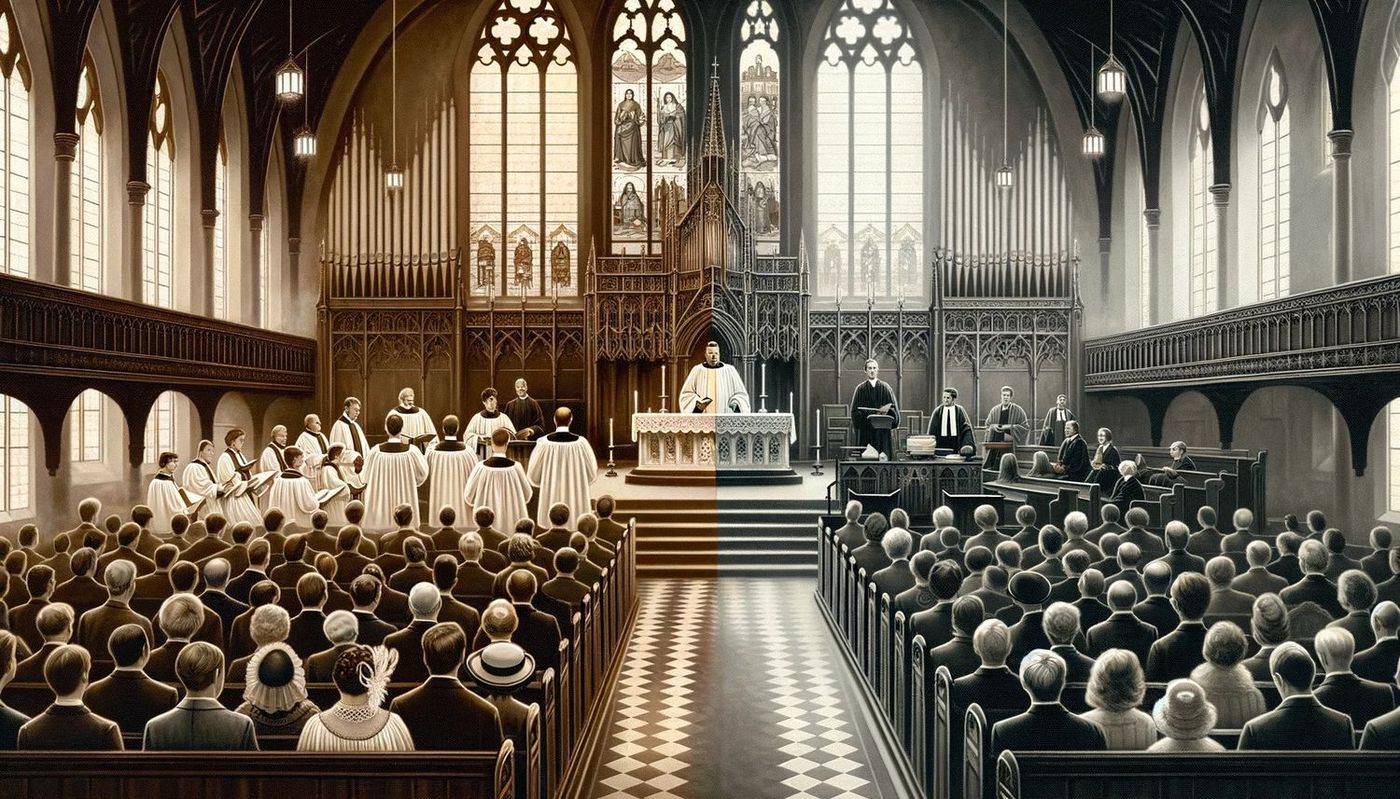Home>Theology and Spirituality>What Is The Difference Between A Baptist And A Lutheran


Theology and Spirituality
What Is The Difference Between A Baptist And A Lutheran
Published: February 20, 2024
Ericka Andersen, an editor at Christian.net, expertly merges digital strategy with content creation, focusing on faith and societal issues. Her communication skills enhance the platform's engaging narratives, fostering meaningful dialogue on belief's impact on society.
Discover the key distinctions between Baptist and Lutheran beliefs in theology and spirituality. Explore their differences and similarities in faith and practice.
(Many of the links in this article redirect to a specific reviewed product. Your purchase of these products through affiliate links helps to generate commission for Christian.net, at no extra cost. Learn more)
Table of Contents
Introduction
When exploring the rich tapestry of Christian denominations, it's fascinating to delve into the nuances that distinguish one from another. In this article, we will embark on a journey to unravel the differences between two prominent Christian traditions: Baptist and Lutheran. While both are rooted in the Christian faith, they have distinct theological perspectives, worship practices, and church structures that shape their identities.
The Baptist tradition traces its origins to the 17th century, emerging from the English Separatist movement. Baptists emphasize the significance of believer's baptism, wherein individuals make a conscious decision to be baptized based on their personal faith in Jesus Christ. This act symbolizes the believer's identification with the death, burial, and resurrection of Jesus Christ. On the other hand, Lutheranism, stemming from the Protestant Reformation led by Martin Luther in the 16th century, places a strong emphasis on the doctrine of justification by grace through faith. Lutherans practice infant baptism, viewing it as a means of God's grace and a sign of inclusion in the Christian community.
As we delve deeper into the beliefs, practices, theological differences, worship styles, and church structures of these two traditions, we will gain a profound understanding of their distinctiveness. This exploration will shed light on the diverse expressions of the Christian faith and the beautiful tapestry of beliefs that enrich the global Christian community.
Beliefs and Practices
The Baptist tradition is characterized by its belief in the autonomy of the local church and the priesthood of all believers. Each congregation operates independently, with its own governance and decision-making processes. This autonomy allows for a strong emphasis on individual freedom and responsibility in matters of faith and practice. Baptists hold firmly to the authority of the Bible as the ultimate source of truth and guidance for Christian living. They prioritize personal conversion and the necessity of a conscious, voluntary decision to follow Christ, which is symbolized through believer's baptism by immersion. This act is seen as a public declaration of one's faith and a powerful symbol of spiritual rebirth.
In contrast, Lutherans hold to the belief in the priesthood of all believers as well, but they emphasize the role of ordained clergy in leading worship and administering the sacraments. Lutherans adhere to the Lutheran Confessions, which are a collection of documents that outline the key theological convictions of the tradition. These confessions serve as a guide for interpreting the Scriptures and shaping the doctrinal stance of the Lutheran Church. Lutherans practice infant baptism, viewing it as a means of God's grace and a sign of inclusion in the Christian community. They also hold to the practice of the Eucharist, or Holy Communion, as a central element of their worship, believing in the real presence of Christ in the bread and wine.
Both traditions place a strong emphasis on the preaching of the Word, with sermons playing a central role in their worship services. However, the styles of worship can differ significantly. Baptists often embrace a more informal and spontaneous approach to worship, with a focus on heartfelt expressions of praise and worship. In contrast, Lutheran worship is characterized by a more structured liturgy, incorporating formal elements such as responsive readings, prayers, and the singing of hymns. The use of liturgical colors and symbols also holds significant meaning in Lutheran worship, adding a layer of visual and symbolic richness to their services.
In summary, while both traditions share a commitment to the Christian faith, their beliefs and practices reflect distinct theological emphases and worship styles. These differences contribute to the diverse tapestry of Christian expression and offer unique avenues for individuals to encounter and engage with the Christian faith.
Theological Differences
The theological variances between the Baptist and Lutheran traditions are rooted in their distinct interpretations of key doctrinal principles. One of the fundamental theological disparities lies in their understanding of salvation and the role of faith. Baptists emphasize the concept of "believer's baptism," viewing it as an outward expression of an individual's personal faith in Jesus Christ. This act symbolizes the believer's identification with the death, burial, and resurrection of Jesus Christ and is seen as a public declaration of one's commitment to following Christ. In contrast, Lutherans practice infant baptism, affirming the belief that God's grace is at work in the sacrament, and it serves as a means of inclusion in the Christian community from an early age. This difference in baptismal practices reflects their divergent theological perspectives on the nature of faith and the experience of salvation.
Furthermore, the two traditions diverge in their understanding of the sacraments. While both recognize baptism and the Eucharist as sacraments, they hold differing views on their significance and administration. Baptists generally adhere to a symbolic or "memorialist" view of the Lord's Supper, considering it a symbolic remembrance of Christ's sacrifice and a proclamation of faith. In contrast, Lutherans uphold the belief in the real presence of Christ in the Eucharist, emphasizing the spiritual nourishment and communion with Christ that occurs through the reception of the bread and wine. This theological contrast in their understanding of the sacraments shapes the way these traditions approach and experience these central aspects of Christian worship and spiritual life.
Additionally, the Baptist and Lutheran traditions diverge in their ecclesiological perspectives, particularly in the structure and governance of the church. Baptists emphasize the autonomy of the local church, with each congregation operating independently and making its own decisions regarding matters of faith and practice. This congregational polity reflects their theological conviction in the priesthood of all believers and the freedom of individual congregations to govern themselves. On the other hand, Lutherans often adhere to a more hierarchical or connectional structure, with a greater emphasis on the role of ordained clergy and regional synods in decision-making processes. This difference in church governance reflects their distinct theological perspectives on the nature of the church and the role of leadership within the Christian community.
In summary, the theological differences between the Baptist and Lutheran traditions encompass their perspectives on salvation, the sacraments, and church governance, reflecting their unique theological emphases and interpretations of key Christian doctrines. These theological distinctions contribute to the rich diversity of Christian expression and offer valuable insights into the multifaceted nature of the Christian faith.
Worship and Sacraments
The worship practices and sacramental theology of the Baptist and Lutheran traditions offer profound insights into their distinctive approaches to spiritual expression and communal worship. Both traditions hold the act of worship in high regard, yet their styles and theological underpinnings exhibit notable differences.
In the Baptist tradition, worship is often characterized by its informal and participatory nature. Services may feature lively congregational singing, heartfelt prayers, and dynamic preaching that emphasizes the practical application of biblical teachings to everyday life. The focal point of Baptist worship is the believer's baptism by immersion, which symbolizes the individual's personal faith in Jesus Christ and serves as a public declaration of their commitment to following Christ. This act of baptism is viewed as a deeply meaningful and transformative experience, representing spiritual rebirth and a profound connection to the Christian community.
On the other hand, Lutheran worship is marked by a more structured and liturgical approach, incorporating formal elements such as responsive readings, prayers, and the singing of hymns. The use of liturgical colors and symbols holds significant meaning in Lutheran worship, adding a layer of visual and symbolic richness to their services. Central to Lutheran worship is the celebration of the Eucharist, or Holy Communion, which is viewed as a sacred and central aspect of their spiritual life. Lutherans believe in the real presence of Christ in the bread and wine, emphasizing the spiritual nourishment and communion with Christ that occurs through the reception of the sacrament.
Regarding the sacraments, both traditions recognize baptism and the Eucharist as significant acts of worship and spiritual significance. However, they diverge in their theological interpretations of these sacraments. Baptists generally adhere to a symbolic or "memorialist" view of the Lord's Supper, considering it a symbolic remembrance of Christ's sacrifice and a proclamation of faith. In contrast, Lutherans uphold the belief in the real presence of Christ in the Eucharist, emphasizing the spiritual nourishment and communion with Christ that occurs through the reception of the bread and wine.
In essence, the worship and sacramental practices of the Baptist and Lutheran traditions reflect their unique theological perspectives and approaches to spiritual expression. These distinct worship styles and sacramental beliefs contribute to the rich tapestry of Christian worship and offer diverse avenues for individuals to engage with the Christian faith in meaningful and profound ways.
Church Structure and Governance
The structure and governance of churches play a pivotal role in shaping the identity and functioning of Christian traditions. In the Baptist tradition, the principle of congregational autonomy is a defining feature of church structure and governance. Each Baptist congregation operates independently, with its own governance and decision-making processes. This autonomy allows for a strong emphasis on individual freedom and responsibility in matters of faith and practice. The congregation, comprised of the church members, holds the authority to make decisions regarding matters such as leadership appointments, financial management, and doctrinal beliefs. This congregational polity reflects the Baptist theological conviction in the priesthood of all believers and the freedom of individual congregations to govern themselves.
On the other hand, Lutherans often adhere to a more hierarchical or connectional structure in their church governance. The Lutheran Church is organized into synods, which are regional groupings of congregations that work together in matters of shared mission, ministry, and governance. These synods provide a framework for collaboration and decision-making at a regional level, allowing for a more interconnected and cooperative approach to church governance. Additionally, Lutherans place a greater emphasis on the role of ordained clergy in leading worship and administering the sacraments, reflecting a distinct ecclesiological perspective on the role of leadership within the Christian community.
Furthermore, the role of leadership within Baptist and Lutheran churches differs significantly. In Baptist congregations, leadership positions such as pastors, elders, and deacons are often filled by members of the congregation through a process of nomination and election. This democratic approach to leadership selection aligns with the Baptist emphasis on individual participation and shared responsibility within the church community. In contrast, Lutheran churches often have a more structured process for the selection and appointment of clergy, with a greater emphasis on the role of ordained ministers in providing spiritual leadership and pastoral care to the congregation.
In summary, the church structure and governance of the Baptist and Lutheran traditions reflect their distinct theological perspectives on the nature of the church, the role of leadership, and the autonomy of individual congregations. These differences contribute to the diverse expressions of Christian community and offer valuable insights into the organizational dynamics of these rich Christian traditions.
Conclusion
In conclusion, the exploration of the Baptist and Lutheran traditions reveals a rich tapestry of theological perspectives, worship practices, and church governance that distinguish these two prominent Christian denominations. While both traditions are rooted in the Christian faith and share a commitment to the core beliefs of Christianity, their distinctiveness offers valuable insights into the diverse expressions of the Christian faith and the multifaceted nature of Christian community.
The Baptist tradition, with its emphasis on believer's baptism, congregational autonomy, and the priesthood of all believers, reflects a strong commitment to individual freedom and responsibility in matters of faith and practice. Baptists prioritize personal conversion and the symbolic act of believer's baptism by immersion, viewing it as a public declaration of one's faith and a powerful symbol of spiritual rebirth. The informal and participatory nature of Baptist worship, coupled with their symbolic view of the Lord's Supper, creates a vibrant and engaging worship experience that resonates with their theological convictions.
On the other hand, Lutheranism, with its emphasis on the doctrine of justification by grace through faith, the Lutheran Confessions, and the sacramental life of the church, embodies a more structured and liturgical approach to worship and spiritual life. Lutherans practice infant baptism as a means of God's grace and inclusion in the Christian community from an early age, and they hold to the belief in the real presence of Christ in the Eucharist, emphasizing the spiritual nourishment and communion with Christ that occurs through the reception of the sacrament. The hierarchical or connectional structure of Lutheran church governance, along with the role of ordained clergy in leading worship and administering the sacraments, reflects their distinct ecclesiological perspective on the nature of the church and the role of leadership within the Christian community.
In essence, the differences between the Baptist and Lutheran traditions contribute to the rich diversity of Christian expression and offer unique avenues for individuals to encounter and engage with the Christian faith. These traditions, with their theological nuances, worship styles, and church structures, enrich the global Christian community and provide meaningful opportunities for spiritual growth and communal worship.
As we navigate the intricate landscape of Christian denominations, the distinctiveness of the Baptist and Lutheran traditions serves as a testament to the beauty of diversity within the body of Christ. While they may diverge in certain theological emphases and practices, both traditions ultimately share a common foundation in the Christian faith and contribute to the vibrant mosaic of Christian belief and practice. It is through the appreciation of these differences and the celebration of shared faith that the global Christian community continues to thrive and flourish, embracing the richness of its diverse expressions.














